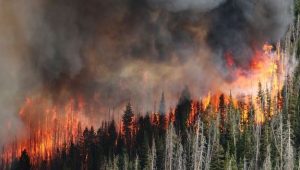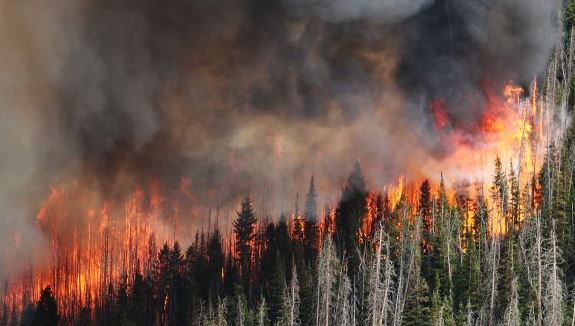 SALT LAKE CITY — After a destructive and expensive wildfire season last year, a House panel advanced a resolution urging the federal government to pursue policies allowing for better forest management — but only after stripping language that also urged the federal government to minimize additional climate change.
SALT LAKE CITY — After a destructive and expensive wildfire season last year, a House panel advanced a resolution urging the federal government to pursue policies allowing for better forest management — but only after stripping language that also urged the federal government to minimize additional climate change.
The House Natural Resources, Agriculture and Environment Committee voted 11-2 Friday to advance HCR5 to the House floor, largely in support of the resolution sponsored Rep. Ray Ward, R-Bountiful, but not going so far as to acknowledge climate change is part of the problem.
Fire seasons in Utah have been “exceptionally destructive,” the resolution states. Last year alone, the state saw over 480,000 acres scorched and 400 structures burned, with firefighting costs estimated to be $150 million.
Last year, Utah County wildfires forced thousands to evacuate for days, and for weeks after, the Wasatch Front’s already poor summer air quality suffered even more.
Ward said his resolution was to address two issues aggravating Utah’s worsening fire seasons: the need for better cooperation with federal partners on forest management solutions, as well as acknowledgement of scientific consensus that climate change is real and causing real problems in the U.S. and across the world.
“These are two very important things we need to try to work with federal partners to make happen for the health of our forests and for our state,” Ward said.
But Rep. Tim Hawkes, R-Centerville, motioned to amend the resolution to strip the climate change language, arguing the resolution would find more consensus in the Utah Legislature if it avoided “wading into what I think are very complicated and difficult questions” and whether the resolution supports “social policies that we might question.”
Rep. Phil Lyman, R-Blanding, supported the amendment, saying the climate change language added “a layer of complexity and politics that don’t go along with reducing damage from wildfires.”
That’s despite a Weber State University professor, John Armstrong, who said he teaches courses dealing with climate change, urging lawmakers to support the connection between climate change and wildfires.
“It’s our job to recognize (what) the sciences are telling us,” Armstrong said. “This problem is not going away.”
Still, Hawkes’ amendment passed. Some Republicans still opposed Ward’s resolution — Rep. Derrin Owens, R-Fountain Green, and Rep. Keven Stratton, R-Orem — but it ultimately gained a favorable recommendation from the committee.
The resolution now goes to the House floor.
You may also like
-
Arizona rancher sues to stop million-acre national monument
-
VDH: How to Destroy the American Legal System
-
Protect The Harvest: The whole truth about Western ranching
-
Colorado conservation group sues wildlife officials for skirting NEPA to get wolves into the state
-
Polis adds another radical activist to Colorado Parks & Wildlife Commission


Really Now.
Perhaps log what needs logged…that’s about All of it.
Do a lot of low level winter burns to thin and cleanup understory.
Graze Everything.
It’s called Land Management.
Btw, lotto a bunch of land off.
People will use it, manage it etc..